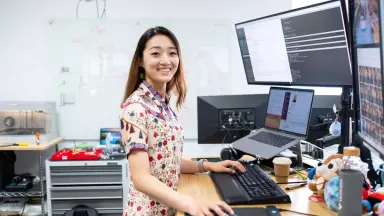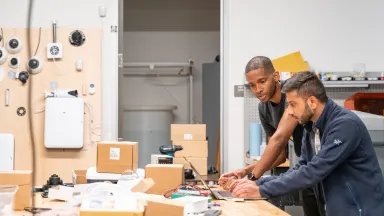Siddarth Prakash: Developing a Reliable, Secure Cloud Infrastructure
Growing up, Siddarth Prakash loved taking things apart. “I liked learning how they worked and repairing them,” he says. “I’ve taken many things apart, VCRs, TVs, pens, computers…most of which have successfully been put back together.”
His parents encouraged his interest and bought him an inexpensive computer to experiment with. “I was immediately hooked, swapping out parts in the computer, running various operating systems, and just figuring out how it worked. That one computer eventually turned into a home lab with five computers, and several other devices.”
Planning to work in hardware, Siddarth went to the University of Waterloo in Ontario for computer engineering, then got his Masters in Computer Science at Georgia Tech. But he soon found a new passion: software engineering. “My first software engineering internship in the Bay Area made me immediately throw hardware out the window and focus on software engineering,” he says.
During the COVID-19 pandemic, Siddarth was home in Toronto and got a call from a few former coworkers who had joined Verkada. “Verkada did not have a dedicated infra[structure] team at the time,” he recalls. “I started as a software engineering contractor, just working a couple days a week from my home in Toronto. As I started working, I started to get really drawn into these projects and found myself willingly spending almost the entire week working on them.” Within a few months, he was working full time for Verkada.
More than a year later, in late 2021, he finally was able to visit Verkada’s headquarters in person for the first time, which led to Siddarth and his family moving to San Mateo permanently. “I was immediately drawn to it,” he recalls. “It’s an amazing environment to work in as an engineer. So many smart people from various backgrounds working closely together. It’s very easy to go by someone’s desk and hash out a technical problem with them, whiteboard creative solutions to problems, etc. The culture of innovation and development speed are infectious.”
What do you work on at Verkada? “I’m an engineer and manager on the infrastructure team, now specifically working on cloud infrastructure. Engineers at Verkada rely on me and my team to deliver a reliable, secure and efficient cloud infrastructure, so that they can deliver their features to customers. If Verkada’s engineering team were a city, the infrastructure team’s job would be to run city services all the way from 311 to 911. On cloud infra specifically, our jobs vary from building roads (giving engineers a place to run their code), to making sure roads are well paved (building tools to make work easier for engineers) to emergency services when the unexpected happens (outages/incidents impacting Verkada’s services).”
What’s special about working at Verkada?
“First, I love collaborating in person with my colleagues — it helps build community and makes our work even better. Beyond that culture element, engineers have a lot of responsibility and independence to brainstorm ideas and execute projects at Verkada. There’s an opportunity to own large projects as an individual engineer or a small team (our cloud infra team is only six engineers). A team of four engineers was able to deploy Terraform and Kubernetes in nine months. At other companies, I imagine this would take two to three times as long! The engineering team at Verkada is fast-paced, innovative, and very persistent in their work.”
What makes you excited to come to work?
“At first, I did not think that building systems for physical security would be this interesting. But I have found that there are so many unique challenges to overcome to develop mission-critical systems and manage the scale of hundreds of thousands of connected devices that I wake up feeling excited about heading to work.”
What advice would you give someone looking to work in your field?
“Be curious — a core trait of being a software engineer is to design new software systems. Being curious and willing to learn from other engineers, or existing software, gives you a big leg-up since you can incorporate the wisdom and experience from others into your future projects. The software engineering industry is also changing very rapidly so being curious helps you pick up new technologies very quickly.”





